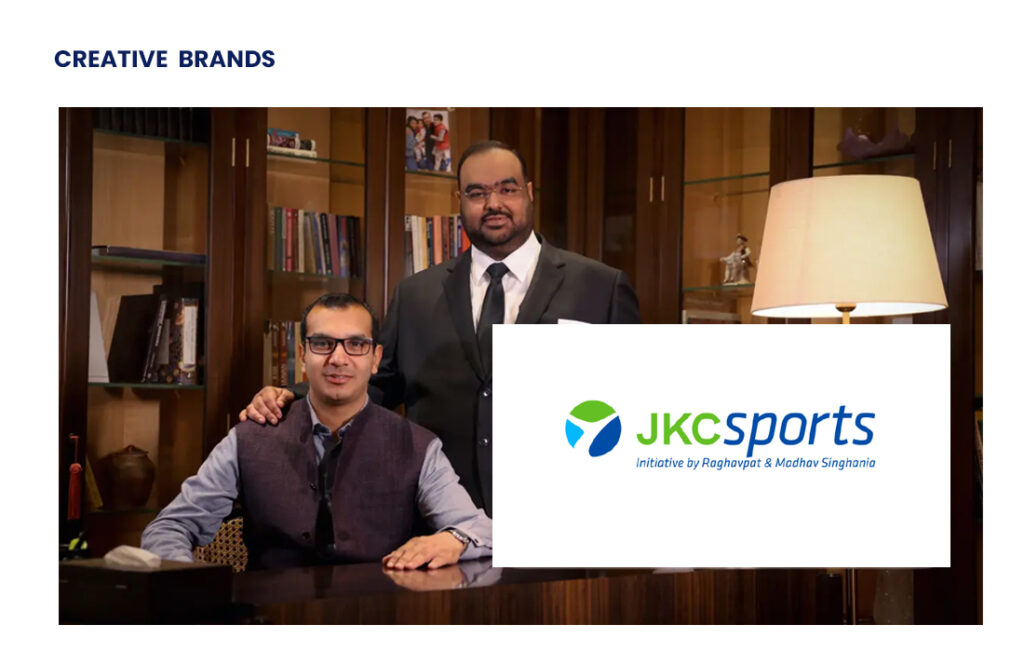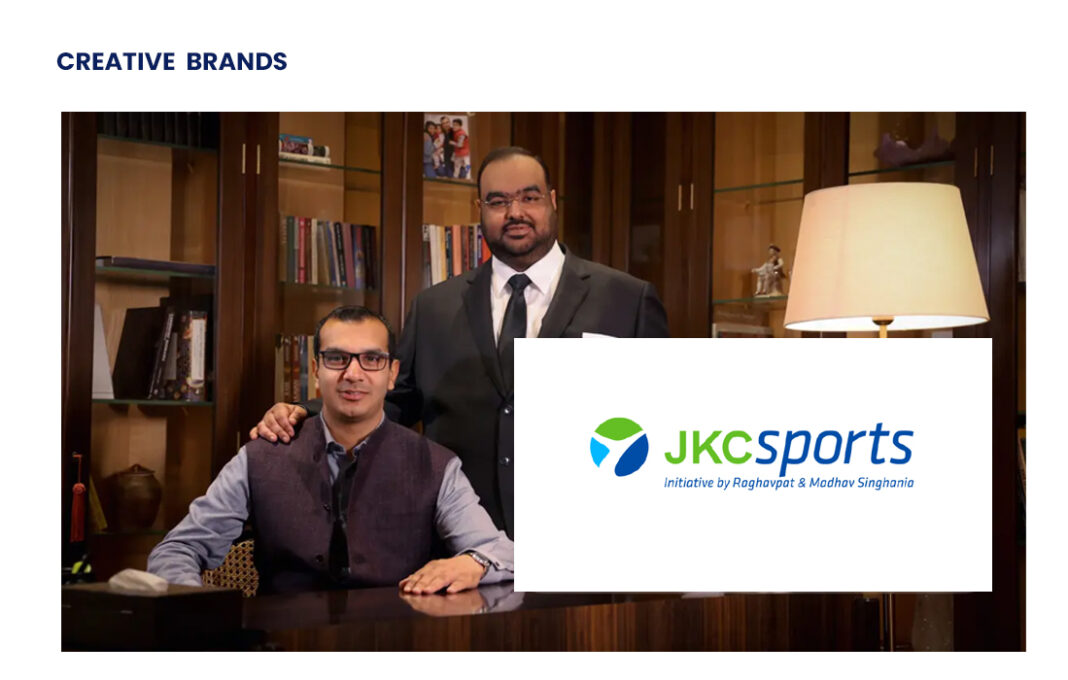JKC Sports has officially launched under Dr. Raghavpat Singhania and Madhav Singhania, unveiling a long-term, multi-sport strategy focused on athlete development, sports science, infrastructure, and digital content. With three key verticals and a nation-building vision, the venture aims to strengthen India’s sports ecosystem and support the country’s Olympic aspirations for 2036.

JKC Sports has officially entered India’s professional sports landscape with a promise to operate not just as another sports venture but as a long-term, multi-sport institution built on structured pathways, athlete development and sustainable sporting ecosystems. The initiative, led by Dr. Raghavpat Singhania and Madhav Singhania, marks the formal entry of the J.K. Cement leadership into the sporting sector, backed by decades of the Singhania family’s contribution to education, youth development and institution-building. The launch reflects a larger national ambition: to create a sports culture robust enough to support India’s aspirations of hosting the 2036 Olympic Games.
The timing of this announcement coincides with a period of unprecedented growth in Indian sport. From global cricket leagues to emerging interest in Olympic disciplines, the country is witnessing a shift in how sport is consumed, commercialised and nurtured. Against this backdrop, JKC Sports aims to become a stable pillar in the country’s sporting architecture—not simply through team ownership or sponsorships, but through a deeply integrated multi-vertical strategy. Their model combines sports science, technology, grassroots participation and digital content to build a broad, future-ready sports portfolio.
According to the founders, JKC Sports will grow through three core verticals. The first is a global fitness and wellness platform, intended to meet rising demand for accessible, science-backed fitness solutions. As India becomes one of the world’s fastest-growing fitness markets, the platform is expected to function at the intersection of performance, lifestyle and preventive health—areas where technology and behavioural design increasingly shape consumer adoption.
The second vertical, JKC Sports Media, will focus on digital IPs, signalling the company’s intent to build storytelling assets, fan-engagement properties and youth-oriented sports content. With India’s digital consumption booming, long-term sports brands are no longer built only on-field; they require year-round narratives, athlete stories, data-driven insights and community-led engagement. This media vertical will allow the company to create digital-led ecosystems that stay relevant to younger fans and reflect the evolving nature of sports consumption.
The third vertical, a High-Performance Centre, sits at the heart of JKC Sports’ developmental philosophy. The centre will integrate coaching, sports science, athlete analytics, training methodologies and structured development pathways. Its purpose is to create competitive, well-supported athletes—an outcome that India has long struggled to produce at scale. By combining physical conditioning, mental wellness, injury management, nutrition and performance analytics, the centre aims to move beyond fragmented training approaches and offer a holistic ecosystem. For emerging talent across disciplines, such centres often become the difference between potential and podium finishes.
For Dr. Raghavpat Singhania, sport is not an incidental interest but an extension of his long-standing involvement in education, youth development and national-building initiatives. As the Managing Director of J.K. Cement Limited, he has overseen the growth of one of India’s leading cement organisations, but his parallel work through the Yadupati Singhania Vocational Education Foundation, Sir Padampat Singhania University and multiple educational institutions has consistently emphasised structured learning pathways. He sees JKC Sports as part of the same continuum. “This initiative goes beyond team ownership—it is about building long-term sporting architecture,” he said. “Our focus is on value creation, training ecosystems, and community development that can inspire and sustain sporting aspiration.”
His vision aligns with a broader global trend where sports organisations are no longer built solely around competition but around systems that nurture talent from the earliest stages. In India, where talent is abundant but infrastructure uneven, a structured, athlete-centric model could bridge critical gaps and help create more consistent pipelines for competitive success.
Madhav Singhania, who serves as Joint Managing Director and CEO of J.K. Cement Limited, brings complementary strengths. A Carnegie Mellon University graduate and a member of The Economic Times’ 40 Under Forty Class of 2025, he is known for strategic thinking and innovation-led business transformation. His leadership in expanding JK Cement into global markets and diversifying into decorative paints demonstrates an appetite for calculated expansion. But his involvement in sport is equally hands-on. As President of the UP Squash Rackets Association, he has worked across grassroots, training and competitive tiers to make squash more accessible and structured in the state.
For Madhav, JKC Sports has a dual mission: to fuel ambition in young athletes and to contribute to national development through sport. “JKC Sports is founded on the belief that sport can be transformational and contribute to the cause of nation-building,” he explained. “We aim to build structured pathways, fuel ambition among young athletes, and contribute to India’s evolving global sporting profile.” His experience in talent structures and infrastructure development will be crucial as the company moves into multi-sport pathways—a need that grows as India sets its sights on greater Olympic and international representation.
While the immediate roadmap focuses on organisational development across the three verticals, the long-term ambition is more expansive. JKC Sports intends to build a credible multi-sport portfolio that spans infrastructure assets, franchise investments, sports-tech innovation and digital-first fan ecosystems. Their strategy suggests that they are not restricting themselves to established sports alone. The inclusion of sports tech signals an understanding that data, performance analytics, AI-powered training tools and wearable technologies will define the next decade of athlete development.
The emphasis on digital content also reflects a shift in how the company perceives its audience. Young fans today are as likely to discover sports through social media and streaming platforms as through live broadcasts. By investing early in digital IPs, JKC Sports intends to engage this audience where they already are and build loyalty that extends beyond match days.
The announcement also comes at a moment when India’s ambition of hosting the 2036 Olympics is gaining momentum. For such a bid to be successful, the country must demonstrate not only infrastructural capability but also a strong, sustainable sports culture built on grassroots participation and high-performance preparedness. JKC Sports’ long-term, multi-sport framework aligns with this national objective. By creating pathways that develop well-rounded athletes, supporting community participation and leveraging technology, the company aims to contribute directly to India’s emerging sporting identity on the global stage.
Both founders bring distinct yet complementary leadership strengths shaped by years of building large-scale, value-driven institutions. Dr. Raghavpat Singhania, known for turning JK Cement into a global brand and leading significant educational initiatives, offers a deep understanding of systems and institutional frameworks. Madhav Singhania, who has successfully modernised the company’s business structure and expanded internationally, represents a newer generation of leadership driven by innovation, digital thinking and global aspirations.
Together, their vision for JKC Sports is rooted in continuity—extending the family’s legacy of institution-building—while also embracing the transformation that modern sport demands. Their backgrounds suggest a leadership team that understands both the business and cultural dimensions of sport, giving JKC Sports a strong foundation as it seeks to scale.
With the official launch, JKC Sports signals its arrival not as a short-term venture but as a future-facing sports institution with national and international ambitions. The initiative stands at the intersection of athlete development, digital content, sports science, infrastructure and community engagement. As India continues its rise as a global sports market, JKC Sports enters at a defining moment—one where the right structures, leadership and long-term thinking could shape not just teams or athletes but the country’s sporting future itself.
Discover more from Creative Brands
Subscribe to get the latest posts sent to your email.






